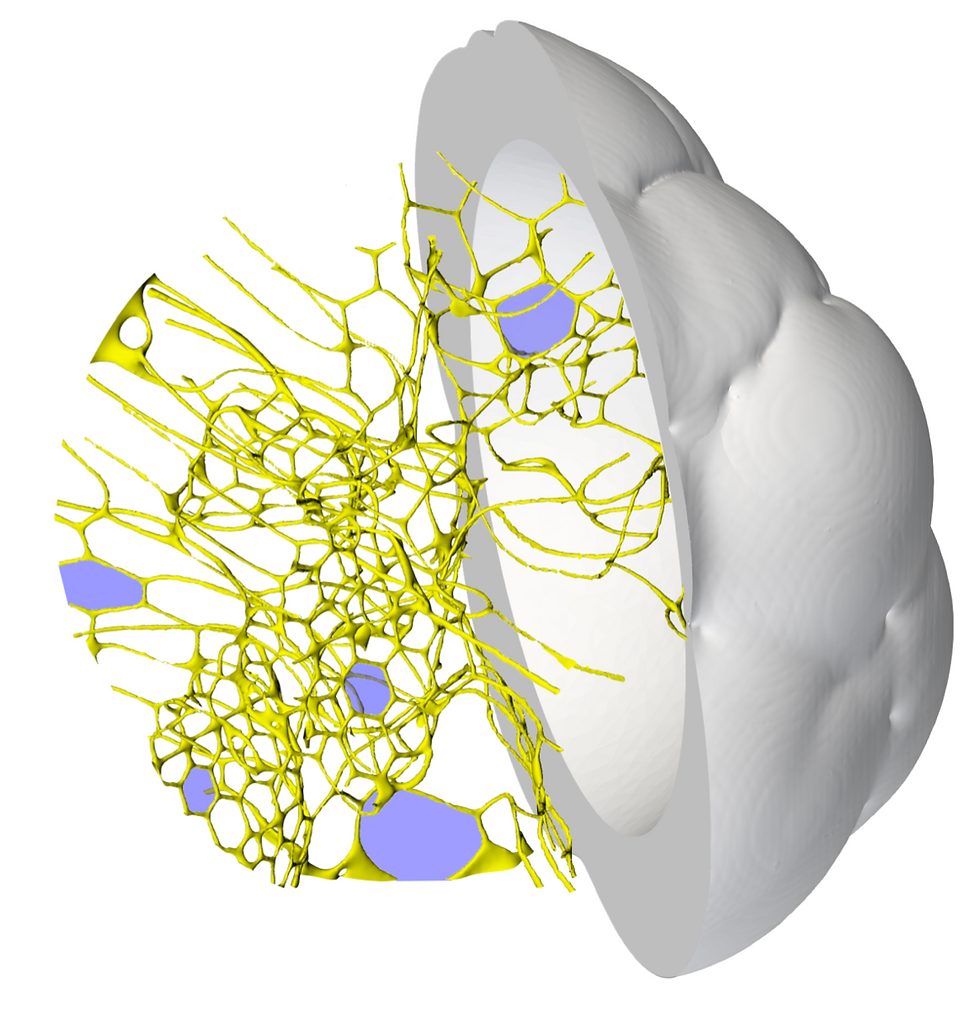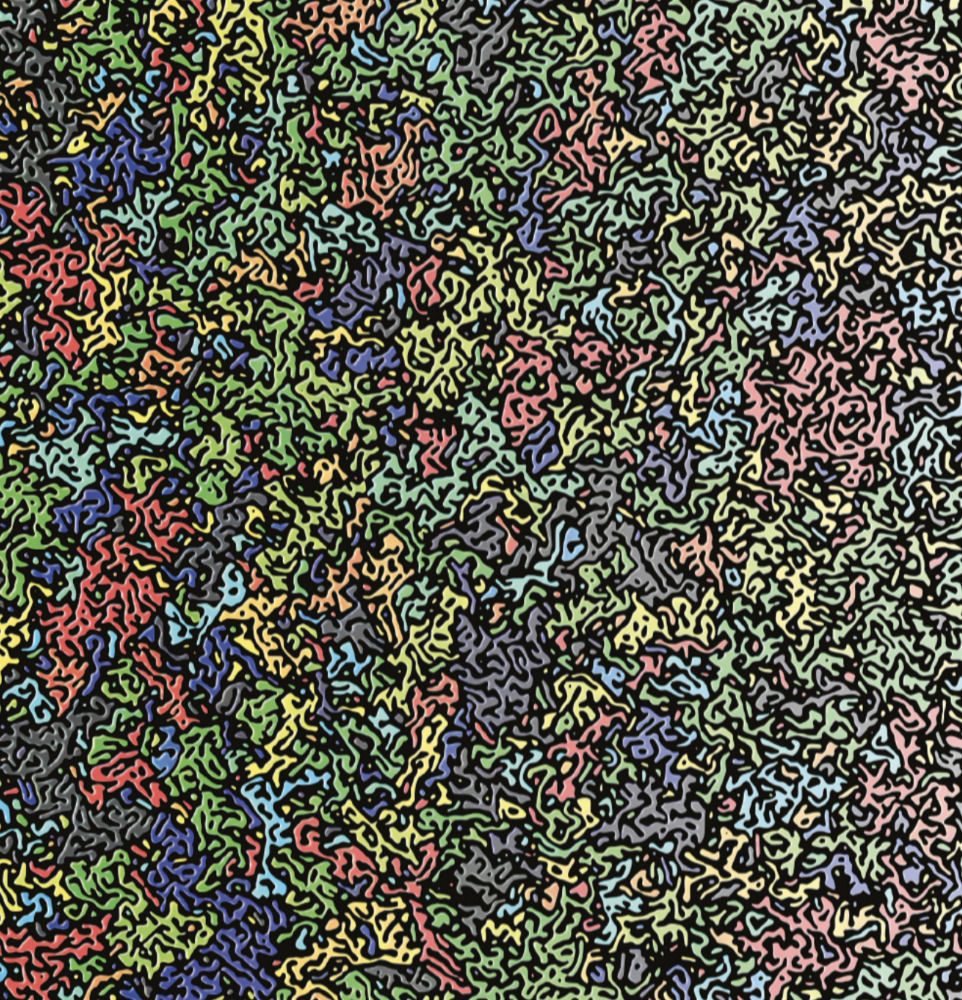ABOUT
We are an Interdisciplinary Research Group, working at the Institute of Scientific Computing and the Dresden Center of Computational Materials Science of TU-Dresden. We develop mesoscale models to study material properties comprehensively, predict/explain experimental behaviors, and investigate the complexities of crystalline materials. This research is carried out with the aid of numerical simulations and state-of-the-art computational techniques.
The research activities illustrated here started a few years ago carried out by the PI and co-workers. They merged into the 3MS group in early 2021 with funding from the DFG Emmy Noether Programme.

LATEST NEWS

Jan. 27-28, 2026
Presentation at MPI-SusMat workshop on AI / theory mat. modeling
The research on descriptors for mesoscale modeling and design of material microstructures, at the workshop on AI and Theory for Sustainable Materials, organized by the Max Planck Institute for Sustainable Materials in Düsseldorf.

Jan. 19th, 2026
Welcome Daniele, New Postdoc in 3MS Group
Dr. Daniele Lanzoni, previosuly at University of Genova joined our group! Welcome. He will work on improvements of our modes towards integrating data-driven approaches with classical coarse-grainign methods. Existing times ahead!

Nov. 17th, 2025
Paper in npj Spintronics
The work on the role of defects (dislocations) in mediating rotations of magnetic stripe patterns has been published in npj Spintronics. A minimal Swift-Hohenberg model explains the underlying mechanisms. Collaboration with MPI-CPFS.

Nov. 10, 2025
Dr. Daniele Lanzoni visits the 3MS Group!
Dr. Daniele Lanzoni, an expert in ML techniques combined with phase-field and other continuum models, visits the group for two weeks. Exchange activities at the Institute of Scientific Computing and at the Faculty of Engineering are planned. Welcome!
RESEARCH












PROJECTS
Analysing structure-property relations in equilibrium and non-equilibrium hyperuniform systems
DFG -Project. Group Role: PI, PhD Students
Hyperuniform (HU) systems exhibit suppressed large-scale density fluctuations and include both ordered (e.g., crystals) and disordered arrangements with strong correlations. Disordered HU patterns arise across disciplines and can yield unique properties, notably in optics. Yet, their mechanical, rheological, and active-matter-related behaviors remain underexplored. This project aims to deepen our understanding of HU structure–property relations by developing advanced, multiscale descriptions that go beyond global metrics to include local and topological features. We focus on realistic, finite systems to study elastic responses, anisotropy in spinodal patterns, and the influence of HU on transport and non-equilibrium phenomena such as flow through porous media and active turbulence.
D3 - Data-Driven Design of Resilient Metamaterials
DFG -Research Training Group (RTG) 2868 - 2023-2028 (1st FP). Group Role: PI, PhD Students
The research of this RTG will focus on metamaterials, i.e. delicate structures produced by 3D printing that are perceived as a material in a component. The design of the internal structure enables tailored, sometimes extraordinary properties for applications in the mobility, medical and energy sectors. The investigations planned in D³ are aimed at both the mechanical performance and the sustainability of the new materials. The vision of D³ is to develop and apply a fully digital, data-driven approach to design metamaterials that is transferable to other material systems. The 3MS group is involved tosupport mesoscale modeling and the description of patterns for inverse design
Ordering and defects on deformable surfaces
DFG Project (FOR3013) - 2023-2026. Group Role: PI, Postdoc, PhD Students
This project focuses on the development of a mesoscale framework to study positional ordering and defects on deformable surfaces by using different modeling approaches and develop their extension to non-flat domains. The amplitude expansion of the phase-field crystal model is considered to handle elasticity and plasticity at the mesoscale without resolving atoms but retaining details of the crystal structure. Orientational ordering and deformable interacting objects, e.g. cells in epithelial tissues, will be modeled by a multi-phase-field approach governed by Allen-Cahn type equations and coupling with director and Q-tensor fields. Formulations suitable for non-flat domains will be developed via a general graph formulation.
A Mesoscale framework for the modeling of defects and interfaces in crystals
DFG Project (Emmy Noether Programme) - 2021-2026. Group Role: PI, Postdoc, PhD Students
This project addresses the mesoscale modeling of crystalline systems. It builds on the phase-field crystal (PFC) model and its amplitude expansion (APFC), which provide convenient coarse-grained descriptions of crystalline structures. It aims at i) delivering novel theoretical tools that bridge micro- and macroscopic features while studying crystals accounting for real material properties, ii) overcoming limitations of current state-of-the-art theoretical approaches in this field through new and hybrid approaches, iii) enabling applications to technology-relevant crystalline systems and related open problems in materials science.
NAtuRal instability of semiConductors thIn SOlid films for sensing and photonic applications - NARCISO
EU FET-Open Project - 2019-2022. Group Role: Research partner as IWR
NARCISO "NAtuRal instability of semiConductors thIn SOlid films for sensing and photonic applications"is an interdisciplinary project merging physics, chemistry, material science, fluid dynamics, and photonics with a high potential for applications and industrial scale-up of the relevant results. We propose to exploit the natural instability of thin solid films (solid state dewetting of silicon and germanium, SSD) to form complex patterns and nano-architectures (e.g. monocrystalline atomically-smooth structures, disordered hyperuniform metamaterials) that cannot be implemented with conventional methods.
Micro-crystals Single Photon InfraREd detectors – µSPIRE
EU FET-Open Project - 2017-2021. Group Role: Research partner as IWR
µSPIRE aims at establishing a technological platform for homo- and hetero- structure based photonic and electronic devices using the self-assembling of epitaxial crystals on patterned Si substrates. Emerging micro-electronic and photonic devices strongly require the integration on Si of a variety of semiconducting materials such as Ge, GaAs, in order to add novel functionalities to the Si platform. µSPIRE pursues this goal employing a novel deposition approach, which we termed vertical hetero-epitaxy (VHE), optimizied with the aid of simulations. VHE exploits the patterning of conventional Si substrates, in combination with epitaxial deposition, to attain the self-assembly of arrays of Ge and GaAs epitaxial micro-crystals elongated in the vertical direction, featuring structural and electronic properties unparalleled by “conventional” epitaxial growth.




ACTIVE COLLABORATIONS
Axel Voigt, Markus Kästner, Ivo Sbalzarini - TU-Dresden, DE ■ Ken R. Elder - Oakland Univeristy, USA ■ David J. Srolovitz - The University of Hong Kong ■ Jian Han - City University of Hong Kong ■ Marco Abbarchi, Isabelle Berbezier - IM2NP, Aix-Marseille Universite', France ■ Steven M. Wise - The University of Tennessee, USA ■ Francesco Montalenti, Roberto Bergamaschini - University of Milano-Bicocca, Italy ■ Giovanni Isella, Monica Bollani - LNESS, Politecnico di Milano, Italy ■ Luiza Angheluta - University of Oslo, Norway ■ Jorge Vinals - University of Minnesota, USA ■ Zhi-Feng Huang - Wayne State University, USA ■
.png)

SELECTED PUBLICATIONS
-
Dislocations mediate rotations in magnetic stripe patterns - npj Spintronics 2025 ⇨
-
Mesoscale Field Theory for Quasicrystals - PRResearch 2024 ⇨
-
Nonequilibrium hyperuniform states in active turbulence - PNAS 2024 ⇨
-
Persistent homology and topology of hyperuniform patterns - PRResearch 2024 ⇨
-
Disconnection flow-mediated grain rotation - PNAS 2024 ⇨
-
A general non-singular theory of topological defects - npj computational materials 2023 ⇨
-
Faceting-Defaceting transition mediated by disconnections - Acta Materialia 2023 ⇨
-
Design of Mie resonator by solid state dewetting- Optics Express 2023 ⇨
-
Topical review on the Amplitude Expansion of the PFC Model - MSMSE 2022 ⇨
-
3D PFC theory of of dislocation kinematics and dynamics - JMPS 2022 ⇨
-
Diffuse interface approach for disconnection interface migration - Acta Materialia 2022 ⇨
-
Continuum modelling of disconnection-mediated interface migration - Acta Materialia 2022 ⇨
-
Mesoscale defect motion in binary systems - PRL 2021 ⇨
-
Doubly degenerate Cahn-Hilliard models - MMAS 2021 I ⇨ MMAS 2021 II ⇨ COVER ⇨
-
Hyperuniform monocrystalline structures by spinodal solid-state dewetting - PRL 2020 ⇨
-
A coarse-grained phase-field crystal model of plastic motion - JMPS 2020 ⇨
-
Ultra-long Silicon nano-wires by templated dewetting - Nature Communication 2019 ⇨
-
Bridging lattice deformations across scales - npj Computational Materials 2019 ⇨
-
Rayleigh-like instability in Ge/Si nano-strips - APL 2018 ⇨
-
Coarse-grained modelling of dislocations at small-angle GBs - PRMaterials 2018 ⇨
-
Self assembly of Si nanostructure by templated dewetting - Science Advances 2017 ⇨
CONTACTS



Prof. Marco Salvalaglio
Visitor Address, IWR
Barmerbau, B 237,
Zellescher Weg 25, 01217 Dresden, Germany
Visitor Address, DCMS
Hallwachsstraße 3,
01069 Dresden, Germany
Postal Address:
Technische Universität Dresden
Institut für Wissenschaftliches Rechnen
Helmholtzstr. 10
01069 Dresden
Tel.: +49 351 463-35657
Fax: +49 351 463-37096
IMPRINT
Copyright
The copyrights for the images used on this website are at Marco Salvalaglio if not otherwise specified. All content may not be copied, distributed, altered, or made accessible without consent.
Disclaimer
Despite careful content control no liability will be accepted for the content of external links. For the content of linked pages their operators are responsible.
Website Design and programming by Marco Salvalaglio using a theme by Wix.com
























